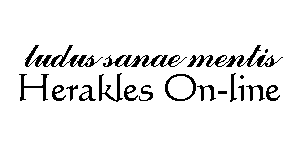| Herakles' & Jardanus' descendants |
The sovereignty of Lydia, which had belonged to the Heraclides,
passed into the family of Croesus, who were called the Mermnadae, in
the manner which I will now relate. There was a certain king of
Sardis, Candaules by name, whom the Greeks called Myrsilus. He was a
descendant of Alcaeus, son of Hercules. The first king of this dynasty
was Agron, son of Ninus, grandson of Belus, and great-grandson of
Alcaeus; Candaules, son of Myrsus, was the last. The kings who reigned
before Agron sprang from Lydus, son of Atys, from whom the people of
the land, called previously Meonians, received the name of Lydians.
The Heraclides, descended from Hercules and the slave-girl of
Jardanus, having been entrusted by these princes with the management
of affairs, obtained the kingdom by an oracle. Their rule endured
for two and twenty generations of men, a space of five hundred and
five years; during the whole of which period, from Agron to Candaules,
the crown descended in the direct line from father to son.
|
| Herakles' & a creature half woman and half snake's descendants become kings of Scythia
|
Such is the account which the Scythians give of themselves, and of
the country which lies above them. The Greeks who dwell about the
Pontus tell a different story. According to Hercules, when he was
carrying off the cows of Geryon, arrived in the region which is now
inhabited by the Scyths, but which was then a desert. Geryon lived
outside the Pontus, in an island called by the Greeks Erytheia, near
Gades, which is beyond the Pillars of Hercules upon the Ocean. Now
some say that the Ocean begins in the east, and runs the whole way
round the world; but they give no proof that this is really so.
Hercules came from thence into the region now called Scythia, and,
being overtaken by storm and frost, drew his lion's skin about him,
and fell fast asleep. While he slept, his mares, which he had loosed
from his chariot to graze, by some wonderful chance disappeared.
On waking, he went in quest of them, and, after wandering over the
whole country, came at last to the district called "the Woodland,"
where he found in a cave a strange being, between a maiden and a
serpent, whose form from the waist upwards was like that of a woman,
while all below was like a snake. He looked at her wonderingly; but
nevertheless inquired, whether she had chanced to see his strayed
mares anywhere. She answered him, "Yes, and they were now in her
keeping; but never would she consent to give them back, unless he took
her for his mistress." So Hercules, to get his mares back, agreed; but
afterwards she put him off and delayed restoring the mares, since
she wished to keep him with her as long as possible. He, on the
other hand, was only anxious to secure them and to get away. At
last, when she gave them up, she said to him, "When thy mares
strayed hither, it was I who saved them for thee: now thou hast paid
their salvage; for lo! I bear in my womb three sons of thine. Tell
me therefore when thy sons grow up, what must I do with them?
Wouldst thou wish that I should settle them here in this land, whereof
I am mistress, or shall I send them to thee?" Thus questioned, they
say, Hercules answered, "When the lads have grown to manhood, do thus,
and assuredly thou wilt not err. Watch them, and when thou seest one
of them bend this bow as I now bend it, and gird himself with this
girdle thus, choose him to remain in the land. Those who fail in the
trial, send away. Thus wilt thou at once please thyself and obey me."
Hereupon he strung one of his bows- up to that time he had carried
two- and showed her how to fasten the belt. Then he gave both bow
and belt into her hands. Now the belt had a golden goblet attached
to its clasp. So after he had given them to her, he went his way;
and the woman, when her children grew to manhood, first gave them
severally their names. One she called Agathyrsus, one Gelonus, and the
other, who was the youngest, Scythes. Then she remembered the
instructions she had received from Hercules, and, in obedience to
his orders, she put her sons to the test. Two of them, Agathyrsus
and Gelonus, proving unequal to the task enjoined, their mother sent
them out of the land; Scythes, the youngest, succeeded, and so he
was allowed to remain. From Scythes, the son of Hercules, were
descended the after kings of Scythia; and from the circumstance of the
goblet which hung from the belt, the Scythians to this day wear
goblets at their girdles. This was the only thing which the mother
of Scythes did for him. Such is the tale told by the Greeks who
dwell around the Pontus.
|
| Herakles' Relationship With His Father
|
Such Egyptians as possess a temple of the Theban Jove, or live
in the Thebaic canton, offer no sheep in sacrifice, but only goats;
for the Egyptians do not all worship the same gods, excepting Isis and
Osiris, the latter of whom they say is the Grecian Bacchus. Those,
on the contrary, who possess a temple dedicated to Mendes, or belong
to the Mendesian canton, abstain from offering goats, and sacrifice
sheep instead. The Thebans, and such as imitate them in their
practice, give the following account of the origin of the custom:-
"Hercules," they say, "wished of all things to see Jove, but Jove
did not choose to be seen of him. At length, when Hercules
persisted, Jove hit on a device- to flay a ram, and, cutting off his
head, hold the head before him, and cover himself with the fleece.
In this guise he showed himself to Hercules." Therefore the
Egyptians give their statues of Jupiter the face of a ram: and from
them the practice has passed to the Ammonians, who are a joint
colony of Egyptians and Ethiopians, speaking a language between the
two; hence also, in my opinion, the latter people took their name of
Ammonians, since the Egyptian name for Jupiter is Amun. Such, then, is
the reason why the Thebans do not sacrifice rams, but consider them
sacred animals. Upon one day in the year, however, at the festival
of Jupiter, they slay a single ram, and stripping off the fleece,
cover with it the statue of that god, as he once covered himself,
and then bring up to the statue of Jove an image of Hercules. When
this has been done, the whole assembly beat their breasts in
mourning for the ram, and afterwards bury him in a holy sepulchre.
|
|
Divinity of Herakles
|
The account which I received of this Hercules makes him one of the
twelve gods. Of the other Hercules, with whom the Greeks are familiar,
I could hear nothing in any part of Egypt. That the Greeks, however
(those I mean who gave the son of Amphitryon that name), took the name
from the Egyptians, and not the Egyptians from the Greeks, is I
think clearly proved, among other arguments, by the fact that both the
parents of Hercules, Amphitryon as well as Alcmena, were of Egyptian
origin. Again, the Egyptians disclaim all knowledge of the names of
Neptune and the Dioscuri, and do not include them in the number of
their gods; but had they adopted the name of any god from the
Greeks, these would have been the likeliest to obtain notice, since
the Egyptians, as I am well convinced, practised navigation at that
time, and the Greeks also were some of them mariners, so that they
would have been more likely to know the names of these gods than
that of Hercules. But the Egyptian Hercules is one of their ancient
gods. Seventeen thousand years before the reign of Amasis, the
twelve gods were, they affirm, produced from the eight: and of these
twelve, Hercules is one.
|
|
Antiquity of Egyptian Herakles
|
In the wish to get the best information that I could on these
matters, I made a voyage to Tyre in Phoenicia, hearing there was a
temple of Hercules at that place, very highly venerated. I visited the
temple, and found it richly adorned with a number of offerings,
among which were two pillars, one of pure gold, the other of
emerald, shining with great brilliancy at night. In a conversation
which I held with the priests, I inquired how long their temple had
been built, and found by their answer that they, too, differed from
the Greeks. They said that the temple was built at the same time
that the city was founded, and that the foundation of the city took
place two thousand three hundred years ago. In Tyre I remarked another
temple where the same god was worshipped as the Thasian Hercules. So I
went on to Thasos, where I found a temple of Hercules which had been
built by the Phoenicians who colonised that island when they sailed in
search of Europa. Even this was five generations earlier than the time
when Hercules, son of Amphitryon, was born in Greece. These researches
show plainly that there is an ancient god Hercules; and my own opinion
is that those Greeks act most wisely who build and maintain two
temples of Hercules, in the one of which the Hercules worshipped is
known by the name of Olympian, and has sacrifice offered to him as
an immortal, while in the other the honours paid are such as are due
to a hero.
The Greeks tell many tales without due investigation, and among
them the following silly fable respecting Hercules:- "Hercules,"
they say, "went once to Egypt, and there the inhabitants took him, and
putting a chaplet on his head, led him out in solemn procession,
intending to offer him a sacrifice to Jupiter. For a while he
submitted quietly; but when they led him up to the altar and began the
ceremonies, he put forth his strength and slew them all." Now to me it
seems that such a story proves the Greeks to be utterly ignorant of
the character and customs of the people. The Egyptians do not think it
allowable even to sacrifice cattle, excepting sheep, and the male kine
and calves, provided they be pure, and also geese. How, then, can it
be believed that they would sacrifice men? And again, how would it
have been possible for Hercules alone, and, as they confess, a mere
mortal, to destroy so many thousands? In saying thus much concerning
these matters, may I incur no displeasure either of god or hero!
|
| Divination
|
With respect to divination, they hold that it is a gift which no
mortal possesses, but only certain of the gods: thus they have an
oracle of Hercules, one of Apollo, of Minerva, of Diana, of Mars,
and of Jupiter. Besides these, there is the oracle of Latona at
Buto, which is held in much higher repute than any of the rest. The
mode of delivering the oracles is not uniform, but varies at the
different shrines.
|





 Back to GeoCities Homesteading Home Page.
Back to GeoCities Homesteading Home Page.